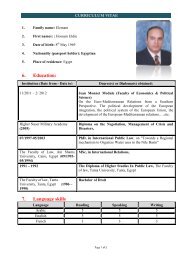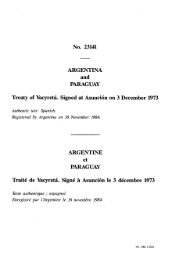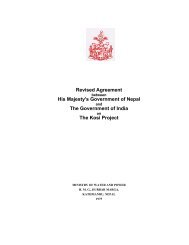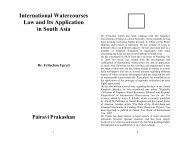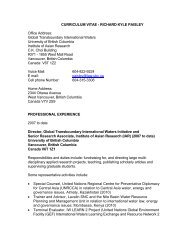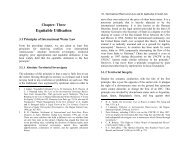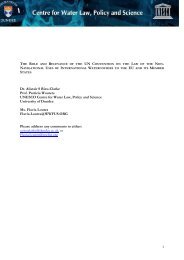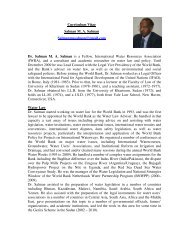Upreti, Trilochan, International Watercourses Law and Its Application ...
Upreti, Trilochan, International Watercourses Law and Its Application ...
Upreti, Trilochan, International Watercourses Law and Its Application ...
Create successful ePaper yourself
Turn your PDF publications into a flip-book with our unique Google optimized e-Paper software.
Equitable Utilisation / 159 160 / <strong>International</strong> <strong>Watercourses</strong> <strong>Law</strong> <strong>and</strong> <strong>Its</strong> <strong>Application</strong> in South Asiadeserves special attention. Thus, equity can be considered ameans to bridge the chasm between the two groups of nationsto achieve justice <strong>and</strong> sustainable development. This is equallyimportant in ensuring peace, prosperity <strong>and</strong> the sustainabledevelopment of the earth, with currently more than six billionpeople <strong>and</strong> with many more people to replace them in the yearsto come. 169 It has become fashionable to quote the word“equity” in most treaties, resolutions, conferences, <strong>and</strong>declarations, joint communiqués <strong>and</strong> so on in political spheresas the meeting point for states with diverse interests <strong>and</strong>agendas.The idea <strong>and</strong> prominence of equity thus implies an appreciationby the world community that prosperity <strong>and</strong> development inone part of the globe is not sufficient to maintain the worldorder. Unbalanced development in several regions could pose athreat to the peace <strong>and</strong> security of the world. The otherrealisation is that the level of development achieved in the pasthas been at the expense of the environment, bringing manyproblems such as, climate change, ozone layer depletion, <strong>and</strong>pollution on l<strong>and</strong>, oceans <strong>and</strong> within fresh water resources. 170In order to carry out the remaining development works in theSouth, pursuant to experience gained in the North, manylessons should be learned to avoid repeating the North’smistakes. The North too must reverse its profligateconsumption of resources. In the meantime, the development ofthe South must not be discouraged or hindered, but carried outby integrating environmental concerns within the framework ofsustainable development. In doing so, the North must cooperateby all means possible with the South in dealing with the169 P. Brown & J. Vidal, “End seas of poverty” , The Guardian, 27 August2002, John Pronk, Envoy of UN Secretary General to the WSSD isquoted as saying that the poverty of developing countries should beaddressed by the help of developed states, p. 3.170 Supra note 159, p. 340.broader interest of a world order characterised by the balanceddevelopment of all nations. To achieve this, the developedstates should increase their ODA contributions. 1713.9 Drainage Basins <strong>and</strong> Diversion of WatersThe evolution of the concept of the drainage basin is significantin this field, in order to fulfil the increasing water requirementfor states. 172 It should be recalled that the first book published(1931) relating to this area is by Smith, who held the view thatthe drainage basin concept must be followed when developing<strong>and</strong> apportioning the benefits from shared water resources. 173The drainage basin concept considers the entire river basin as asingle unit irrespective of political boundaries. US PresidentTheodore Roosevelt advocated this principle."each river system, from its headwaters in the forestto its mouth on the coast, is a single unit <strong>and</strong> shouldbe treated as such". 174Later, the 1911 Madrid Declaration 175 of the Institute of<strong>International</strong> <strong>Law</strong>, in its preamble, recognised the 'permanentphysical dependence' of co-basin states as a principle ofinternational law. Several institutions, such as the ConventionRelating to the Development of Hydraulic Power as adopted bythe Conference of Communications <strong>and</strong> Transit at Geneva in171 Supra note 90, p. 63: following the Second World War, the US gaveaid of almost 2% (100 billion a year) of its GNP to Europe for threeyears. But the USA at present is giving less then 0.7% in aid, most ofthis goes only to Israel, Egypt, Indonesia, <strong>and</strong> China. Jacobs hassuggested increasing the North’s aid.172 C. B. Bourne, "The Development of <strong>International</strong> Water Resources:The Drainage Basin Approach" (1969) in 47 CBR, p. 64.173 Supra note 3, p. 31.174 Supra note 172 p. 64.175 D. A Caponera (ed), The <strong>Law</strong> of <strong>International</strong> Water Resources, Rome:FAO Legislative study no 23, 1980, p. 274.



